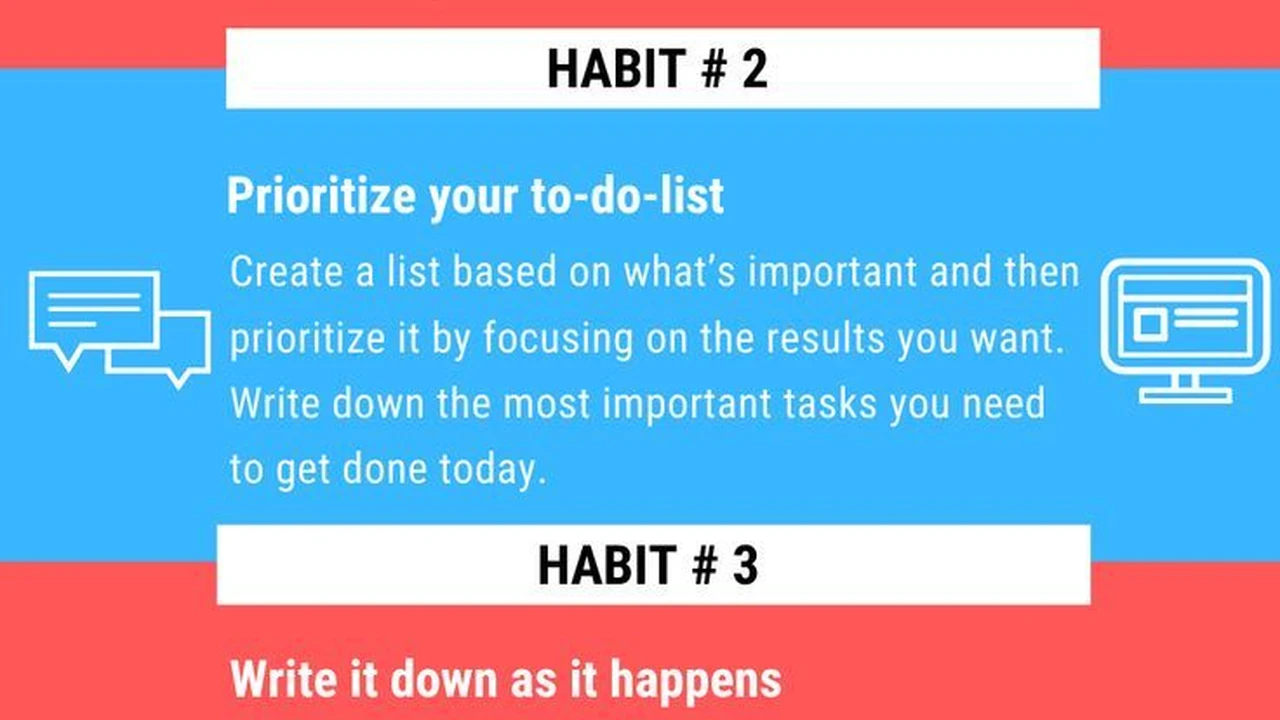7 Habits of Highly Productive Professionals
Explore seven powerful habits adopted by individuals who consistently achieve high levels of productivity.

Explore seven powerful habits adopted by individuals who consistently achieve high levels of productivity. Ever wonder how some people seem to get so much done, effortlessly juggling tasks and hitting their goals while others struggle to keep up? It's not magic, it's about cultivating specific habits that foster productivity. In today's fast-paced world, being productive isn't just a buzzword; it's a necessity for career growth, personal well-being, and overall success. Whether you're a seasoned professional, a budding entrepreneur, or just looking to optimize your daily routine, understanding and implementing these habits can be a game-changer. We're going to dive deep into seven core practices that highly productive individuals swear by, offering actionable insights, practical tips, and even some tool recommendations to help you integrate them into your own life. Get ready to transform your approach to work and unlock your full potential.
7 Habits of Highly Productive Professionals
Mastering Time Management and Prioritization for Peak Performance
One of the most defining characteristics of highly productive professionals is their exceptional ability to manage time and prioritize tasks effectively. It's not about working more hours, but about working smarter. This habit involves a combination of strategic planning, disciplined execution, and a clear understanding of what truly matters.
The Power of the Eisenhower Matrix for Task Prioritization
A classic yet incredibly effective tool for prioritization is the Eisenhower Matrix, also known as the Urgent-Important Matrix. This method helps you categorize tasks into four quadrants:
- Urgent and Important (Do First): These are crises, deadlines, and problems that require immediate attention. Think of a client emergency or a project due by end of day.
- Important but Not Urgent (Schedule): This is where strategic planning, relationship building, and proactive work reside. This quadrant is crucial for long-term success and preventing future crises. Examples include professional development, planning for future projects, or building a strong network.
- Urgent but Not Important (Delegate): These are interruptions and busywork that can often be delegated to others. Think of some emails, certain meetings, or minor requests that don't directly contribute to your core goals.
- Not Urgent and Not Important (Eliminate): These are distractions and time-wasters that should be avoided. Social media scrolling, excessive casual browsing, or unnecessary meetings fall into this category.
By consistently applying the Eisenhower Matrix, you can ensure that your efforts are focused on tasks that yield the greatest impact, rather than simply reacting to every incoming request.
Time Blocking and Calendar Management for Focused Work
Highly productive individuals often employ time blocking, a technique where you allocate specific blocks of time in your calendar for particular tasks or types of work. This creates a structured day and minimizes distractions. For example, you might block out two hours in the morning for deep work on a critical project, followed by an hour for email responses, and then another block for meetings.
Recommended Tools for Time Management and Prioritization:
- Todoist: A powerful and intuitive task manager that allows for detailed task creation, prioritization, and project organization. It integrates well with calendars and offers recurring tasks.
- Trello: Excellent for visual project management and team collaboration. You can create boards for different projects and use cards to represent tasks, moving them through various stages.
- Google Calendar / Outlook Calendar: Essential for time blocking. Use different colors for different types of activities to get a quick visual overview of your day.
- Forest (Mobile App): A unique app that helps you stay focused by growing a virtual tree. If you leave the app before your timer is up, your tree dies, providing a fun incentive to stay on task.
Pricing Comparison:
- Todoist: Free basic plan, Premium starts at $4/month.
- Trello: Free basic plan, Standard starts at $5/user/month.
- Google Calendar / Outlook Calendar: Free with Google/Microsoft accounts.
- Forest: One-time purchase of $3.99 for the Pro version.
Cultivating a Growth Mindset and Continuous Learning for Professional Development
Productivity isn't just about doing more; it's about doing better. Highly productive professionals understand that the world is constantly evolving, and so must their skills and knowledge. They embrace a growth mindset, viewing challenges as opportunities for learning and improvement, rather than insurmountable obstacles.
Embracing Lifelong Learning and Skill Acquisition
This habit involves actively seeking out new information, learning new skills, and staying updated on industry trends. It could be through reading books, taking online courses, attending webinars, or even listening to podcasts during your commute. The goal is to continuously expand your capabilities and adapt to new demands.
Seeking and Applying Constructive Feedback for Improvement
A key aspect of a growth mindset is being open to feedback, both positive and constructive. Productive individuals actively solicit feedback from peers, mentors, and supervisors, and then use that information to identify areas for improvement. They don't shy away from criticism; instead, they see it as a valuable resource for personal and professional growth.
Recommended Platforms for Continuous Learning:
- Coursera: Offers a wide range of courses, specializations, and degrees from top universities and companies. Excellent for in-depth learning and certifications.
- Udemy: Features a vast library of courses on almost any topic imaginable, often taught by industry experts. Great for practical, skill-based learning.
- LinkedIn Learning: Provides video courses taught by industry experts, covering business, creative, and technology topics. Integrates well with your LinkedIn profile.
- MasterClass: Offers online classes taught by world-renowned experts in various fields, focusing on inspiration and high-level insights.
Pricing Comparison:
- Coursera: Many courses are free to audit, paid certificates/specializations vary (e.g., $49-$79/month for a specialization).
- Udemy: Courses are individually priced, often with significant discounts (e.g., $12.99 - $199.99 per course).
- LinkedIn Learning: Free 1-month trial, then $29.99/month or $19.99/month annually.
- MasterClass: Annual membership starts at $120/year.
Practicing Effective Communication and Collaboration for Team Success
No one achieves great things in isolation. Highly productive professionals understand the immense value of clear communication and seamless collaboration, especially in today's interconnected workplaces. This habit is about fostering strong relationships and ensuring that information flows efficiently.
Active Listening and Clear Articulation for Better Understanding
Effective communication starts with active listening – truly understanding what others are saying, rather than just waiting for your turn to speak. It also involves articulating your thoughts, ideas, and expectations clearly and concisely, whether in written form or verbally. This minimizes misunderstandings and saves valuable time.
Leveraging Collaboration Tools for Seamless Teamwork
In a world of remote and hybrid work, mastering collaboration tools is non-negotiable. Productive individuals are adept at using platforms that facilitate shared documents, project tracking, and real-time communication, ensuring everyone is on the same page and progress is visible.
Recommended Tools for Communication and Collaboration:
- Slack: A popular messaging platform for teams, offering channels for different topics, direct messages, and integrations with many other tools.
- Microsoft Teams: A comprehensive collaboration platform that combines chat, video meetings, file storage, and application integration, especially strong for Microsoft 365 users.
- Zoom: The go-to for video conferencing, offering reliable video and audio quality, screen sharing, and recording capabilities.
- Google Workspace (Docs, Sheets, Slides): Essential for real-time collaborative document creation and editing.
Pricing Comparison:
- Slack: Free basic plan, Pro starts at $7.25/user/month.
- Microsoft Teams: Free basic plan, included with Microsoft 365 subscriptions (e.g., Business Basic at $6/user/month).
- Zoom: Free basic plan (40-minute limit for group meetings), Pro starts at $149.90/year/license.
- Google Workspace: Free for personal use, Business Starter starts at $6/user/month.
Prioritizing Well-being and Self-Care for Sustainable Productivity
It's a common misconception that productivity means working non-stop. Highly productive professionals know that sustained output requires regular breaks, adequate rest, and attention to physical and mental well-being. Burnout is the enemy of long-term productivity.
The Importance of Regular Breaks and Adequate Sleep for Focus
Taking short, regular breaks throughout the day can significantly improve focus and prevent mental fatigue. This could be a 5-minute stretch, a quick walk, or even just stepping away from your screen. Equally important is prioritizing adequate sleep. A well-rested mind is a sharp mind, capable of better decision-making and problem-solving.
Mindfulness and Stress Management Techniques for Mental Clarity
Stress is an inevitable part of professional life, but how you manage it makes all the difference. Productive individuals often incorporate mindfulness practices, meditation, or other stress-reduction techniques into their routines. This helps maintain mental clarity, emotional balance, and resilience in the face of challenges.
Recommended Tools for Well-being and Self-Care:
- Calm: A popular meditation and sleep app offering guided meditations, sleep stories, and calming music.
- Headspace: Another leading meditation app with guided sessions for various purposes, including stress, focus, and sleep.
- Fitbit / Apple Watch: Wearable devices that track activity, sleep, and heart rate, encouraging a more active and healthy lifestyle.
- MyFitnessPal: A comprehensive app for tracking diet and exercise, helping you maintain physical health which directly impacts energy levels.
Pricing Comparison:
- Calm: Free basic content, Premium subscription is $69.99/year.
- Headspace: Free basic content, Premium subscription is $69.99/year.
- Fitbit / Apple Watch: Hardware cost varies (e.g., Fitbit Charge 6 around $159.95, Apple Watch SE around $249). Some premium features may require subscriptions.
- MyFitnessPal: Free basic version, Premium subscription is $19.99/month or $79.99/year.
Leveraging Technology and Automation for Efficiency Gains
In the digital age, technology is a powerful ally for productivity. Highly productive professionals are not just users of technology; they are strategic implementers, constantly looking for ways to automate repetitive tasks and streamline workflows.
Automating Repetitive Tasks for Time Savings
Think about tasks you do repeatedly every day or week – sending similar emails, organizing files, scheduling social media posts. Many of these can be automated using various tools, freeing up significant time for more complex and impactful work. This could involve setting up email rules, using templates, or employing automation platforms.
Utilizing Productivity Software and Apps for Streamlined Workflows
Beyond automation, there's a vast ecosystem of productivity software designed to make specific tasks easier and faster. This includes project management tools, note-taking apps, password managers, and more. The key is to choose tools that genuinely enhance your workflow, rather than adding complexity.
Recommended Tools for Technology and Automation:
- Zapier: A powerful automation tool that connects thousands of apps, allowing you to create automated workflows (Zaps) without coding.
- IFTTT (If This Then That): Similar to Zapier, IFTTT allows you to create applets that automate tasks across different services. More consumer-focused but still useful for professionals.
- Evernote / Notion: Excellent for note-taking, organizing information, and creating personal knowledge bases. Notion also offers powerful project management and database features.
- LastPass / 1Password: Secure password managers that save you time and improve security by generating and storing strong, unique passwords.
Pricing Comparison:
- Zapier: Free basic plan, Starter plan starts at $19.99/month.
- IFTTT: Free basic plan, Pro starts at $3.99/month.
- Evernote: Free basic plan, Personal starts at $14.99/month.
- Notion: Free personal plan, Plus starts at $8/user/month.
- LastPass: Free basic plan, Premium starts at $3/month.
- 1Password: Personal plan starts at $2.99/month.
Building Strong Professional Networks for Opportunities and Support
Productivity isn't just about individual output; it's also about the opportunities and support systems you build around yourself. Highly productive professionals are often excellent networkers, understanding that connections can open doors, provide insights, and offer invaluable support.
Strategic Networking for Career Advancement and Knowledge Sharing
Networking isn't just about collecting business cards. It's about building genuine relationships with peers, mentors, and industry leaders. This can lead to new job opportunities, collaborative projects, shared knowledge, and valuable advice. Productive individuals actively seek out networking events, both online and offline, and nurture their connections.
Seeking Mentorship and Offering Peer Support for Mutual Growth
A strong network often includes mentors who can guide you through challenges and offer insights based on their experience. Equally important is offering support to your peers. By helping others, you not only strengthen your network but also reinforce your own understanding and build a reputation as a valuable resource.
Recommended Platforms for Professional Networking:
- LinkedIn: The undisputed leader for professional networking, job searching, and industry news. Essential for building your online professional presence.
- Meetup: A platform for finding and creating local groups and events based on shared interests, including professional development and industry-specific meetups.
- Industry-Specific Forums and Associations: Many industries have dedicated online forums, professional associations, and conferences that are excellent for targeted networking. (e.g., American Marketing Association, IEEE, etc.)
- Eventbrite: While primarily for event discovery, Eventbrite can be used to find professional conferences, workshops, and networking events in your area or online.
Pricing Comparison:
- LinkedIn: Free basic profile, Premium subscriptions (e.g., Career, Business) start at $29.99/month.
- Meetup: Free for members to join groups, organizers pay a subscription (e.g., $9.99/month).
- Industry-Specific Forums and Associations: Membership fees vary widely, often annual (e.g., $50 - $500+).
- Eventbrite: Free for attendees, organizers pay a fee based on ticket sales.
Developing Strong Decision-Making Skills for Impactful Choices
Highly productive professionals don't just do things; they do the right things. This requires strong decision-making skills, the ability to analyze situations, weigh options, and make choices that align with their goals and values. Indecision can be a major productivity killer.
Data-Driven Decision Making and Risk Assessment
Productive individuals often base their decisions on data and evidence rather than pure intuition. They take the time to gather relevant information, analyze potential outcomes, and assess risks. This doesn't mean paralysis by analysis, but rather a thoughtful approach to complex problems.
Learning to Say No and Setting Boundaries for Focus
A crucial aspect of effective decision-making is knowing when to say no. Productive people understand that every 'yes' to something means a 'no' to something else. They set clear boundaries around their time and energy, declining requests that don't align with their priorities or contribute to their core objectives. This protects their focus and prevents overcommitment.
Recommended Tools for Decision-Making Support:
- MindMeister / XMind: Mind mapping tools that help you visually organize thoughts, brainstorm ideas, and explore different options before making a decision.
- Microsoft Excel / Google Sheets: Essential for data analysis, creating comparison tables, and modeling different scenarios to inform decisions.
- Decision-Making Frameworks (e.g., Pros and Cons List, Cost-Benefit Analysis): While not a 'tool' in the software sense, these structured approaches are invaluable. You can implement them using simple text editors or spreadsheets.
- Focus@Will: An app that provides scientifically optimized music to help improve focus and concentration, which can be beneficial when making complex decisions.
Pricing Comparison:
- MindMeister: Free basic plan, Personal starts at $6/month.
- XMind: Free basic version, Pro starts at $39.99/6 months.
- Microsoft Excel / Google Sheets: Included with Microsoft 365 subscriptions or free with Google accounts.
- Focus@Will: Free trial, then $9.99/month or $69.99/year.
:max_bytes(150000):strip_icc()/277019-baked-pork-chops-with-cream-of-mushroom-soup-DDMFS-beauty-4x3-BG-7505-5762b731cf30447d9cbbbbbf387beafa.jpg)






